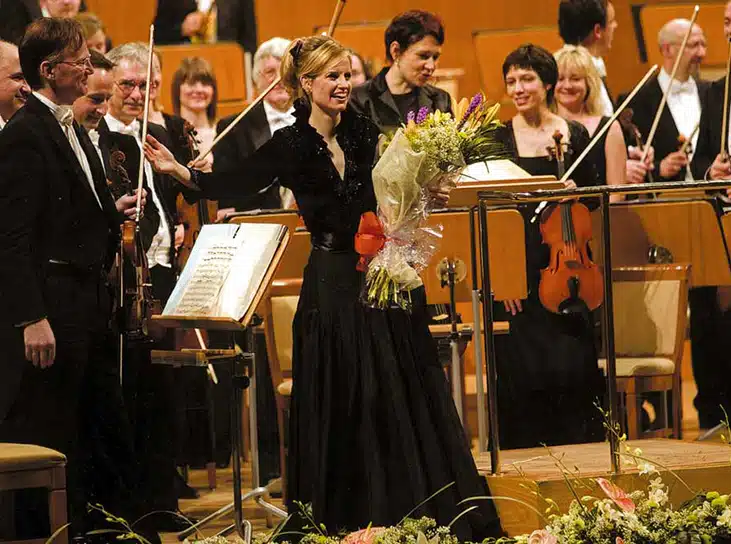SUSTAINABILITY | 03.08.2024
Inma Shara, Orchestra Conductor: “With determination and passion, there are no limits”
In the coming years, women will stand on the podiums of prestigious orchestras. This is the belief of Inma Shara (Basque Country, 1972), one of the world’s most acclaimed orchestra conductors, a profession witnessing a surge in female talent, inspired by leaders like her.
Her love of music began when she was very young. By the age of 4, she was already playing the piano. At 27, she made her debut as an orchestra conductor, and by 47, she had authored a on the great challenge of leadership onstage. She admits that her aim isn’t to excel for others but for herself, striving to convey honesty and sincerity to her audience.
You’ve conducted top-level orchestras such as the Israel Philharmonic Orchestra and the London Philharmonic London Philharmonic, and you were also the first woman to conduct a concert in the Vatican. What did you feel?
Irrespective of the stage, music holds the power to stir emotions, to unite the audience. It’s these elements that make the moment exceptional, helping me to go on with greater strength, to exceed my limits each day, and to foster an environment where we all come out stronger.
Currently, there are hardly any women serving as principal conductors of orchestras. How do you see the future of classical music?
The integration of women into orchestras has been a slow, gradual process. Today, there is a female majority among the ranks, yet we still need to see more women at the conductor’s podium. I am confident this will happen because, despite the challenges we face, there is abundant talent. My ambition is for young girls to see orchestra conducting as an exciting profession that connects with the pulse of the audience. If a young woman dreams of becoming a conductor, she must understand that with determination, self-discipline, and passion, there are no limits.

What impact does music have on people’s health and development?
There are countless benefits. Music is therapy, nourishment for the soul. It is a tool to improve communication, it helps us manage stage fright, enables public expression, and is crucial for individuals dealing with mental illness, acting as a kind of medicine. For children, an orchestra fosters multiple skills. It teaches them to listen, to improve themselves through an instrument, and to work as a team, understanding the importance of collaboration to interpret a musical piece.
You’ve received major accolades. How do you rate your career?
The myriad expressions of gratitude and appreciation I’ve received throughout my career have given me the strength to carry on, with enthusiasm, integrity, and consistency. My aim isn’t to excel for others but for myself, striving to convey honesty and sincerity. In the orchestra, each member contributes their unique heartbeat to the piece, and its strength lies in the unwavering dedication of its members, who offer their artistic talents, energy, and generosity to the group. Beyond seeking renowned individuals, we look for committed people who are eager to foster transformation and teamwork.
How did you discover your calling?
From a very young age, I was immersed in the world of art and received a thorough academic education. While I dabbled in painting and dance, it was music that held the greatest sway in my life. I began playing the piano and other instruments at the age of four. It’s often said that we are guided by reason, but emotions drive us. In my case, I explored various artistic pursuits until I felt compelled to focus all my efforts on realizing my dream of becoming an orchestra conductor. One of my strengths lies in recognizing the opportunity to pursue a professional career in music, a source of nourishment for the soul and well-being.
You once said you like the sound of silence. How would you describe it?
In our fast-paced society, we often overlook the value of pausing and embracing silence, allowing for introspection. We’re inclined to measure ourselves against external benchmarks, but I believe true competition lies in challenging ourselves, embracing change fearlessly, as navigating unpredictable circumstances can be exhilarating. Learning to coexist with silence is essential, enabling us to reflect on our strengths and weaknesses, and uncovering hidden notes we may have overlooked.
RELATED ARTICLES:




